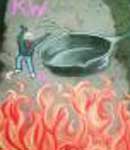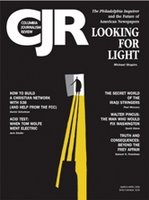On writing, blogging, media and politics...and all the other things that make life interesting.
Monday, March 27, 2006
The kiss of death
Blogger Ben Domenech was hired by the Washington Post to debut a new right-right political blog, Red America. He started Tuesday; by Friday, he was gone. Obviously, it doesn't take other bloggers long to suss out a plagiarist.
Here's Post Executive Editor Jim Brady's letter to the public about the Domenech's resignation, and here's an interesting salon.com interview with Brady about why the Post didn't figure it out first.
Given how easy it is these days to fact-check things online, it's a bad time to be a plagiarist.
P.S. You might also want to check out Poynter Online blogger Romenesko's take on this and other hot media topics.
The journalism program at the University of New Hampshire, where I got my BS degree way back in the old day, has a "no-frills" page of journalism links and resources for students, with tips on interviewing, finding story ideas, storytelling, and much more. Check it out. It also has a good resources page for journalists.
It's a small world...
Apparently he and his seatmate had seen me grading papers on the plane. I told them I teach journalism and PR writing classes at San Jose State, and, yes, I do a lot of editing.
"Well, you're talking to a couple of ex-newsmen," he said, adding that he'd been an editor at a newspaper in San Diego. The other man, Jerry Ackerman, said he'd been an editor at the Boston Globe.
Hmm, my journalism professor when I attended UNH was a former Boston Globe reporter. Did he happen to know Andrew Merton? He did. In fact, Merton used to work for him.
I hope to catch up with Merton while I'm in New Hampshire this week (I'll need a break from helping clean out my parent's house) and if I do, I'll pass on a hello from Jerry Ackerman.
Monday, March 13, 2006
Out of the frying pan?
 What's worse than being put on the auction block in the first place? How about being told you don't make the grade, and you're going to resold to pay the bills.
What's worse than being put on the auction block in the first place? How about being told you don't make the grade, and you're going to resold to pay the bills.That's the situation the folks at the San Jose Mercury News found themselves in today. After perhaps feeling some initial relief that McClatchy, the well-regarded owner of the Sacramento Bee and 11 other U.S. dailies, had submitted the winning $6.5 billion bid for the Knight-Ridder newspaper chain, they found out that their new owner plans to reduce his debt load by selling off some of the less promising papers in the K-R chain...and that his list of losers includes the Mercury News.
That leaves them still hanging fire, and more likely to end up with an owner who will "slash and burn" the newsroom in an attempt to cut costs and pull more profits out of the paper.
In a briefing last week to JMC faculty on the impending sale of the K-R chain, Editor-in-Residence Jerry Ceppos voiced some of those kinds of concerns and listed what he considered to be the three most likely outcomes for San Jose and the Mercury News. He didn't envision this one.
But Ceppos did offer one suggestion that now seems prescient. No matter who buys K-R, he said, we should watch for two things: whether journalists end up near the seat of power, and how much debt the buyer must take on to complete the buyout. That's what will determine whether or not the K-R buyout turns out to be good for journalism, he said.
From that perspective, things aren't looking so good for San Jose and the Mercury News.
In an article in today's WSJ, K-R Chairman and CEO Tony Ridder acknowledges that the "uncertainty is not over" for the 12 K-R newspapers that will be resold, "and I regret that very much."
In the same article, McClatchy CEO Gary Pruitt said he did not anticipate having trouble selling those K-R newspapers, and that the proceeds would be used to pay down debt.
Sunday, March 12, 2006
At the end of the tunnel?
 While we worry about how new owners could affect the quality of journalism at the Mercury News and other Knight Ridder newspapers, Michael Shapiro offers food for thought in the current cover article of CJR. In it, he tells how one of the top newspapers in the KR chain, the Philadelphia Enquirer, has fared under what KR's managment.
While we worry about how new owners could affect the quality of journalism at the Mercury News and other Knight Ridder newspapers, Michael Shapiro offers food for thought in the current cover article of CJR. In it, he tells how one of the top newspapers in the KR chain, the Philadelphia Enquirer, has fared under what KR's managment.The upshot: it ain't pretty. Here's an excerpt from his article, Looking for Light:
The Inquirer, it was said in a tone used to describe a handsome friend who has not aged well, was not what it was.... No one was suggesting that the Inquirer had become a bad newspaper, far from it. But it had become duller — yet another newspaper whose occasional highs seemed to come at ever longer intervals. That judgment was rendered both from afar and from within the paper’s white tower of a home on North Broad Street.The Inquirer had gone through three editors in the last six years, had by last summer seen its newsroom staff already reduced since 1999 from 600 to 500, and perhaps saddest of all, had gone from being perhaps the most alluring and electric place in the business to work to yet another newsroom where some young reporters wondered whether they would have been wiser to have gone to law school.
Shapiro, a writer and media critic, teaches at the Graduate School of Journalism at Columbia University.
New student journalism blog
 Here's an interesting new blog/website hybrid, the Blue Plate Special, produced by NYU Journalism Prof. Jay Rosen and his Blogging 101 students. Each "edition" mixes blog posts, interviews and informational features on a single subject. They plan to publish this cross between an online magazine and a blog monthly.
Here's an interesting new blog/website hybrid, the Blue Plate Special, produced by NYU Journalism Prof. Jay Rosen and his Blogging 101 students. Each "edition" mixes blog posts, interviews and informational features on a single subject. They plan to publish this cross between an online magazine and a blog monthly.Blue Plate Special No. 1 focuses on Newspaper Blogging: State of the Art and asks: "What happens when the people in the newspaper wing of the legacy media start blogging?" It includes a chart the Blue Plate Special team created on the state of blogging at America's 100 biggest newspapers, and a list of the best blogging newspapers in the United States.
I like this concept. What do you think of it?
More on Blogging
Some students view blogs as online personal diaries that are of little value to news audiences. Sure, there are lots of "online journals" out there, but many savvy media writers and media organizations are also experimenting with blogs in interesting (and, I would argue, valuable) ways. Here are a few examples:
- The Editors Weblog, published by the World Editors Forum, offers "editorial solutions for the newspaper renaissance." It covers trends in news reporting, editing and news coverage worldwide.
- NewMediaMusings, a blog by J.D. Lasica, former editor of the Sacramento Bee and now a writer, blogger, media consultant and director of Ourmedia.org, a grassroots citizen media project.
- VisualEditors blog, the news editing and design network, offers comments and links to news on the media.
- AdRants, a blog/website that combines commentary on advertising, marketing and media trends with "a pinch of attitude."
- Church of the Customer blog, an informative (and self-promoting) blog by two marketers, Ben McConnell and Jackie Huba, on the effects of word of mouth on customer loyalty and "customer evangelism."
- Micropersuasion, a blog by Edelman Senior VP Steve Rubel that "explores how new technologies are transforming marketing, media and public relations."
- PR meets the WWW, a blog on public relations, communication, and the World Wide Web of new technologies, by Constantin Basturea, founder of NewPR Wiki and co-organizer of Global PR Blog Week.
Has blogging changed from a liability to an asset in the PR job market?During the nascent days of blogging, when both emerging and large corporations were firing staffers for blogging-related offenses, the jury was out on whether blogging was a nefarious habit, to be hidden when applying for jobs, or a positive career move.
The recent ascension of two high-profile bloggers - Steve Rubel, formerly of CooperKatz, and Jeremy Pepper, formerly of his own firm Pop PR, who were hired by Edelman and Weber Shandwick, respectively - suggests the negative valence of blogging has turned positive. Indeed, today's more pressing question isn't whether you can get a job if you blog, but, rather, whether you can get a job without a blog.
Well, the short answer is yes, but it's more complicated than that.... (direct link to the rest of this story)
It's still possible to argue that blogging is just the "fad du jour," but I think it's getting harder. I think blogging is a significant emerging medium. In fact, you could say blogs are to the World Wide Web what cable TV is to television. (Of course, you might argue that blogs are like HGTV and the Oxygen channel, not ESPN, HBO and MTV...and I'd probably agree.)
The media world is changing and we've got to change with it...or be left behind.